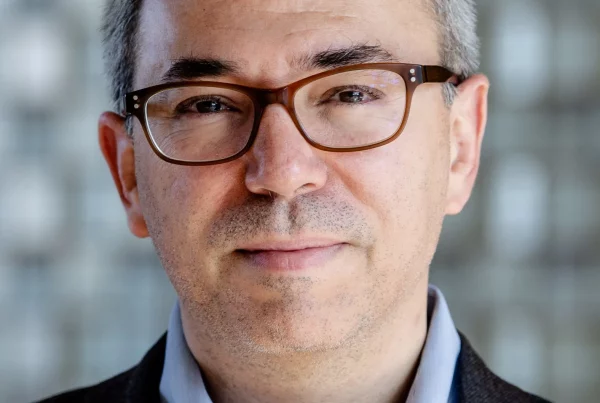PAUL ROMER
ECONOMIST AND POLICY ENTREPRENEUR, CO-RECIPIENT OF THE 2018 NOBEL PRIZE IN ECONOMICS. SCIENCES AND UNIVERSITY PROFESSOR IN ECONOMICS AT NYU.
PAUL ROMER
Paul Romer, economist and policy entrepreneur, is a co-recipient of the 2018 Nobel Prize in Economics Sciences and University Professor in Economics at NYU. He has spent his career at the intersection of economics, innovation, technology, and urbanization, working to speed up human progress.
For Paul’s Full Bio see below.
Topics:
The Lesson from Crisis: Progress Requires a Government That is Narrow But Strong
In this presentation, Professor Romer reviews the laissez-faire school of economic thought, which since the 1960s has extolled the benefits of a free market and cast government as an impediment to those benefits. He shows how, in the relative calm of the 1980s to the early 2000s, this mindset led to the erosion of the government’s capacity to prevent and manage crises. He then offers advice on how to respond to the far-ranging turbulence and frustration which, stirred by the 2008 financial crisis and intensified by the COVID-19 pandemic, have bred support for authoritarian politicians who promise a government that can get things done. As Romer demonstrates, the lesson from history is that neither laissez-faire nor authoritarian technocracy can sustain long-run progress. In the decades to come as in the past, he argues, success and growth will belong to those nations that best meet one fundamental challenge: maintaining a democratically accountable government that is restricted in scope but strong, effective, and efficient in doing its job.
Economic Recovery in the COVID-19 Era
As the pandemic continues to weaken economies in every country, there has been some confusion about whether America is in an economic recession or depression. The answer would depend on who you talk to and what industry they are in, since, as we have seen, some sectors (shipping, tech, e-commerce) have seen an uptick in business as a result of the pandemic. But what about those who have suffered deep losses – mainly small businesses and individuals? Had the White House acted on Professor Romer’s repeated calls for mass testing and isolation as soon as the pandemic hit in March 2020, the loss of jobs and lives would have been significantly reduced; but that advice was ignored. While it will be a long road, Professor Romer does see a way out. In this presentation, he explains how innovation and experimentation will lead to solutions and ways we can better respond to future disruptions.
How Leaders Can Fuel Growth in a World with Finite Resources
The most important insight from economics is that progress is a race to discover new ideas that free us from the constraints imposed by scarce resources. For the last 10,000 years, new ideas have been winning the race and humans have made dramatic progress. Professor Romer says resources are like the ingredients in cooking, ideas are the recipes and progress is the result of millions of small ideas discovered by people working all over the world, some in research, others in the workplace. In this keynote, Professor Romer will discuss the important role leaders and educators can play as guardians and defenders of innovation and experimentation. He’ll explain why it is important to stay open to new ideas from people of all ages and backgrounds, and to be willing to boldly implement ideas that may be outside their comfort zones. If a nation has a market system that encourages an ongoing process of discovery, says Romer, it will make progress that raises the quality of life for everyone.
How Did We Get Here? Living, Innovating and Governing in a Globalised World
Why is populism rising? Why are we facing a new era of trade friction? How can countries cooperate in the face of intense nationalism? In this presentation, Professor Paul Romer draws on his work as a leading global economist – including his research on technological innovation that earned him his Nobel Prize – to address the most important macro trends and challenges facing globally minded leaders today. By showing how trends that enabled the current challenges can be harnessed to create future opportunities and improve the lives of citizens, Romer makes a compelling and optimistic case for why the best is yet to come.
Ensuring America Stays Competitive
In an era of growing divisions, mistrust and inflammatory rhetoric, Professor Paul Romer rises above politics, offering his macro perspective on what the U.S. can and should do to compete with other nations, recognizing that the most successful outcomes can be beneficial for all parties. Focusing on opportunities for growth and innovation across the country, he addresses how updating our thinking on competition can unlock new progress in everything from innovation and business to economic development and education; how redefining our nation’s relationships with innovators and scientists is critical to solving big problems; and how we can leverage the things we can all agree on to continue the grand experiment that is America – regardless of the challenges posed from outside or within.
Cities: Humanity’s Best Hope for Progress
Supreme Court Justice Louis Brandeis once said that states are the laboratories of democracy. In this presentation, Professor Paul Romer lays out his case for why cities are the laboratories of progress in an era of rapid urbanization. He focuses on how cities can attract new residents, how city-scale real estate development can redefine what’s possible for the future of humanity, and what can be done now to unlock untold progress in the hundreds of soon-to-be mega cities that are rapidly emerging. This speech will address key areas of progress cities are uniquely poised to unlock, including timely issues like migration, technological innovation and identity.
The Deep Structure of Economic Growth
The temporary recessions of the global economy seem to be inevitable, but unlimited growth is possible in a world with finite resources. In this compelling presentation, Nobel Prize recipient Paul Romer discusses the current state of the global economy, what has led us to the status quo and how the United States and the rest of world can select a path of economic growth long into the future. He also explains how both domestic and international markets and policy shape the economy.
The Path to Prominence: China and U.S. Relations Yesterday, Today and Tomorrow
China and the United States will share the world stage for generations to come. China’s path to progress and growth in the 20th century was a remarkable turnaround and the current era’s trade frictions are a sign of deeper misunderstandings in this relationship. In this keynote, Professor Paul Romer highlights the innovations that enabled China’s return to global prominence and explains how these two superpowers can shape their interactions and leverage their competition in ways that benefit everyone involved.
These are just some of the topics that have proven valuable to customers in the past and are meant only to suggest Paul’s range and interests. For more information on these topics let us know. Paul researches each and every company he speaks to and for and the final topic is always finalised that works best for the needs of the audience.
BIOGRAPHY
In the current climate of economic upheaval, organizations are finding a much needed sense of direction and optimism in Nobel Laureate economist Paul Romer’s practical and instructive advice. His surprising message? The future is not as bleak as it seems.
Romer, a New York University professor who pioneered the endogenous growth theory, is a former Chief Economist and Senior Vice President of the World Bank. A self-proclaimed policy entrepreneur, he advises business and government leaders in sectors across the world on ways to leverage technology and innovation to drive long-term growth.
While Romer has recently been focusing on solutions to the pandemic-induced economic slide, his steadfast belief in a stronger economic future beyond the crisis remains firmly rooted in the promise of existing and emerging technological advances that will equitably serve the interests of businesses, countries and communities.
Romer says governments can increase the rate of growth — in ways that benefit all citizens — by creating systems of rules that encourage and respond to new technologies.
“For a developing country, the most important rules are those that determine the rate of technology transfer from the rest of the world,” says Romer. “For an advanced economy, the most important rules may be the ones that influence the rate of technological innovation in the private sector.”
A Senior Fellow at the Marron Institute of Urban Management and a leading advocate for charter cities — special reform zones where governments can apply innovative systems of rules that can differ markedly from those in the surrounding area – Romer says the most important rules are those that shape cities. The New Growth Theory he and his colleagues developed outlines a new way to think about wealth creation that gives government leaders more options for improving governance, investors more opportunities to finance socially beneficial infrastructure projects, and people more opportunities to improve the quality of their lives.
In its 2019 review of Romer’s Nobel Prize-winning theory, the Scandinavian Journal of Economics said his work “rejuvenated the field” by placing the search for new ideas by profit-maximizing entrepreneurs and researchers at the heart of economic growth. The article went on to praise the underlying premise of his theory: that nonrivalry of ideas is ultimately responsible for the rise in living standards over time.
Economic Solutions to COVID-19
As the pandemic took hold in America in March 2020, Romer immediately began campaigning for a mass testing and isolation plan to save lives and the economy. He was featured in dozens of media interviews, wrote to policy makers – from the White House to local governors – and finally took out an ad in the New York Times. As an example, he pointed to how Wuhan, China’s aggressive testing and isolation strategy allowed the government to quickly contain the virus and get life and the economy back on track. Though the White House continued to push back, to the peril of its citizens, Romer remained undaunted.
Globalisation, Foreign Trade and Keeping America Competitive
Even as frictions related to globalization threaten foreign trade and America’s ability to compete, Romer remains remarkably optimistic on this front as well. Drawing on his Nobel Prize-winning research on technological innovation, he makes a compelling case for why the best is yet to come, and how the trends that have enabled the current challenges can be harnessed to create future opportunities.
“It really is [about] the global macroeconomics of the tension between the restraining force of scarce resources and the positive force that can come from discovery and innovation,” he remarked during his Nobel Prize acceptance speech. “It’s the balance of these two that will determine our fate.”
PLANNING AN EVENT?
For more information on this speaker, contact Oration Speakers directly.






